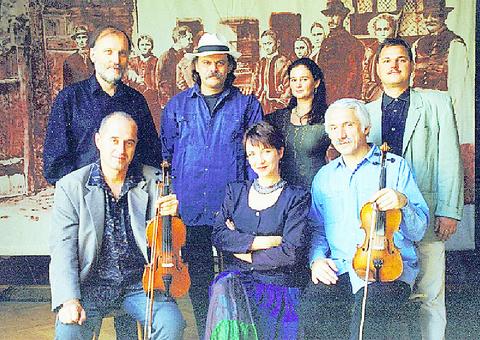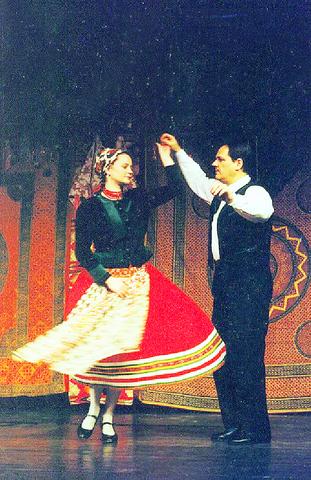Juliette Binoche gets on a truck and leaves Africa behind her -- a place full of memories. The song Love, Love fades in. It teeters on the brink of sentimentality -- but the little bit of piano followed by the voice of Marta Sebestyen fits the mood perfectly. It is cinema magic.
The scene is from The English Patient, and the effectiveness of the score has made many music fans fall in love with Hungarian music group Muzsikas and Marta Sebestyen, pushing this Oscar-winning group to the top of world music rankings.

PHOTO COURTESY OF DADA
But Muzsikas and Marta Sebestyen have done much more than contribute to the soundtrack of The English Patient. They are one of the most original Eastern European music groups currently performing, spending one-third of the year on tour around the world.

PHOTO COURTESY OF DADA
Muzsikas means village musicians in Hungarian. The rise of Muzsikas coincided with the "folk music new wave" that swept Budapest in the 1970s. "We, who grew up in family homes where love of the folk ballad, folk dance and folk music was present daily, were the first to set out to master instrumental folk," Muzsikas declares in its album notes.
The members of the Muzsikas ensemble play and sing in the style of old Hungarian folk bands in which the solo violin and the song typically were accompanied by the three-string viola and contrabass. There are usually other instruments added in their performances, such as mandolin, flute, gardon and koboz, which enrich the sound.
But muzsikas is never simply about instrumental music. It has always been about mixing instruments, voice and dance. In fact, many of the group's members started from a dance background. In the 1970s, amid the folk movement, two dancers, Peter Eri and Sandor Csoori, quit the Bartok Dance Group and invited Mihaly Sipos (violinist) and Daniel Hamar (bassist) to join them in their own group. The four were joined by Marta Sebestyen in the early 1980s.
What exactly is the music of Muzsikas? It can be described as arrangements of Hungarian folk music played in the style of a village musician -- playful and lively. There is a festive spirit to the music, ranging from comical scherzos of a drinking party to the sentimental ballads of Marta Sebestyen. It is the best way of bringing Hungarian rural life to the stage.
Taiwan's audiences experienced the group's charisma five years ago when it released its eighth album, Morning Star.
The most important feature of the group is that it has preserved the ancient style of Hungarian village music. Also the group has never stopped exploring the roots of Hugarian culture. In the 1993 album The Lost Jewish Music of Transylvania, they brought to listeners enchanting and previously unknown music that had been lost in the Holocaust. And in the latest album, The Bartok Album, the group pays homage to great Hungarian composer and musician Bela Bartok, whose music reflects the cultural interaction of Slovaks, Gypsies, Romanians, Serbians and Jews living in Hungary. Much of the music for this week's concert will come from this album.
What: Muzsikas with Marta Sebestyen
When and Where:
Tomorrow 7:30pm at the Sun Yat-sen Memorial Hall, Taipei;
Sunday 7:30pm at the Chihteh Hall of the Kaohsiung City Cultural Center
Tickets: NT$300 to NT$1,500 at Era Ticketing outlets

As we live longer, our risk of cognitive impairment is increasing. How can we delay the onset of symptoms? Do we have to give up every indulgence or can small changes make a difference? We asked neurologists for tips on how to keep our brains healthy for life. TAKE CARE OF YOUR HEALTH “All of the sensible things that apply to bodily health apply to brain health,” says Suzanne O’Sullivan, a consultant in neurology at the National Hospital for Neurology and Neurosurgery in London, and the author of The Age of Diagnosis. “When you’re 20, you can get away with absolute

When the South Vietnamese capital of Saigon fell to the North Vietnamese forces 50 years ago this week, it prompted a mass exodus of some 2 million people — hundreds of thousands fleeing perilously on small boats across open water to escape the communist regime. Many ultimately settled in Southern California’s Orange County in an area now known as “Little Saigon,” not far from Marine Corps Base Camp Pendleton, where the first refugees were airlifted upon reaching the US. The diaspora now also has significant populations in Virginia, Texas and Washington state, as well as in countries including France and Australia.

On April 17, Chinese Nationalist Party (KMT) Chairman Eric Chu (朱立倫) launched a bold campaign to revive and revitalize the KMT base by calling for an impromptu rally at the Taipei prosecutor’s offices to protest recent arrests of KMT recall campaigners over allegations of forgery and fraud involving signatures of dead voters. The protest had no time to apply for permits and was illegal, but that played into the sense of opposition grievance at alleged weaponization of the judiciary by the Democratic Progressive Party (DPP) to “annihilate” the opposition parties. Blamed for faltering recall campaigns and faced with a KMT chair

A police station in the historic sailors’ quarter of the Belgian port of Antwerp is surrounded by sex workers’ neon-lit red-light windows. The station in the Villa Tinto complex is a symbol of the push to make sex work safer in Belgium, which boasts some of Europe’s most liberal laws — although there are still widespread abuses and exploitation. Since December, Belgium’s sex workers can access legal protections and labor rights, such as paid leave, like any other profession. They welcome the changes. “I’m not a victim, I chose to work here and I like what I’m doing,” said Kiana, 32, as she